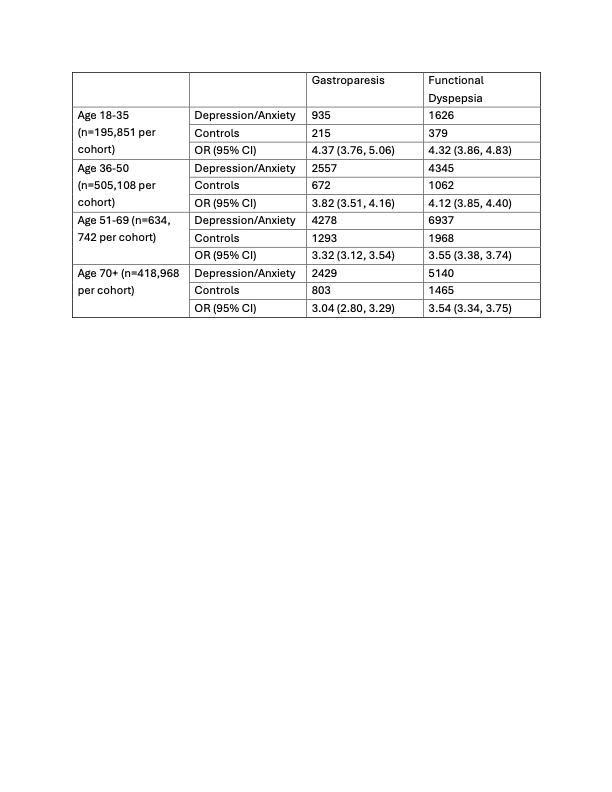Sunday Poster Session
Category: Esophagus
P0675 - Stress Increases Risk of Developing Gastroparesis and Functional Dyspepsia
Sunday, October 26, 2025
3:30 PM - 7:00 PM PDT
Location: Exhibit Hall

Batsheva Rubin, MD, MPH
MetroHealth Medical Center
Cleveland, OH
Presenting Author(s)
Batsheva Rubin, MD, MPH1, Yan Sun, MD2, Gengqing Song, MD, PhD3
1MetroHealth Medical Center, Cleveland, OH; 2Case Western Reserve University / MetroHealth, Cleveland, OH; 3Case Western Reserve University/Metro Health, Cleveland, OH
Introduction: Gastroparesis and functional dyspepsia (FD) significantly impact global morbidity. Although associations between anxiety, depression, and FD are documented, the causative direction remains unclear. This study aimed to elucidate whether patients with anxiety and depression at baseline are more likely to develop gastroparesis and FD.
Methods: This retrospective study utilized the TriNetX US database to compare risks of gastroparesis or FD in patients diagnosed with anxiety or depression versus controls without these conditions. Patients diagnosed prior to 2015 were included, while those with prior gastric motility disorders, systemic sclerosis, or gastroesophageal surgery were excluded. Cohorts underwent 1:1 propensity-score matching for age, sex, race, ethnicity, BMI, diabetes, nicotine or alcohol use, and medications that are known to relate to gastric motility disorders including opioids, calcium channel blockers and parasympatholytic agents. Cohorts were stratified by age: 18–34, 35–50, 51–69, and ≥70 years. Outcomes were assessed over a 10-year follow-up period.
Results: Overall, anxiety or depression significantly increased the risk of developing gastroparesis and FD across all age groups, with the highest odds observed in the youngest group (18–34 years). Matched cohorts were analyzed across four age groups: (1) In the 18–34 year group (n=195,851 each), anxiety or depression patients had significantly increased odds of developing gastroparesis (OR 4.37; 95% CI 3.76–5.06) and FD (OR 4.32; 95% CI 3.86–4.83). (2) In the 35–50 year group (n=505,108 each), ORs were 3.82 (95% CI 3.51–4.16) for gastroparesis and 4.12 (95% CI 3.85–4.40) for FD. (3) In the 51–69 year group (n=634,742 each), ORs were 3.32 (95% CI 3.12–3.54) for gastroparesis and 3.55 (95% CI 3.38–3.74) for FD. (4) In the ≥70 year group (n=418,968 each), ORs were 3.04 (95% CI 2.80–3.29) for gastroparesis and 3.54 (95% CI 3.34–3.75) for FD.
Discussion: Patients with baseline anxiety or depression without prior gastric motility disorders are at substantially higher risk for developing gastroparesis and FD. The potential bidirectionality warrants further investigation into whether treatment of psychiatric conditions mitigates this risk.

Figure: Table 1. Odds ratio of developing gastroparesis or functional dyspepsia in patients with depression and anxiety versus controls.
Disclosures:
Batsheva Rubin indicated no relevant financial relationships.
Yan Sun indicated no relevant financial relationships.
Gengqing Song indicated no relevant financial relationships.
Batsheva Rubin, MD, MPH1, Yan Sun, MD2, Gengqing Song, MD, PhD3. P0675 - Stress Increases Risk of Developing Gastroparesis and Functional Dyspepsia, ACG 2025 Annual Scientific Meeting Abstracts. Phoenix, AZ: American College of Gastroenterology.
1MetroHealth Medical Center, Cleveland, OH; 2Case Western Reserve University / MetroHealth, Cleveland, OH; 3Case Western Reserve University/Metro Health, Cleveland, OH
Introduction: Gastroparesis and functional dyspepsia (FD) significantly impact global morbidity. Although associations between anxiety, depression, and FD are documented, the causative direction remains unclear. This study aimed to elucidate whether patients with anxiety and depression at baseline are more likely to develop gastroparesis and FD.
Methods: This retrospective study utilized the TriNetX US database to compare risks of gastroparesis or FD in patients diagnosed with anxiety or depression versus controls without these conditions. Patients diagnosed prior to 2015 were included, while those with prior gastric motility disorders, systemic sclerosis, or gastroesophageal surgery were excluded. Cohorts underwent 1:1 propensity-score matching for age, sex, race, ethnicity, BMI, diabetes, nicotine or alcohol use, and medications that are known to relate to gastric motility disorders including opioids, calcium channel blockers and parasympatholytic agents. Cohorts were stratified by age: 18–34, 35–50, 51–69, and ≥70 years. Outcomes were assessed over a 10-year follow-up period.
Results: Overall, anxiety or depression significantly increased the risk of developing gastroparesis and FD across all age groups, with the highest odds observed in the youngest group (18–34 years). Matched cohorts were analyzed across four age groups: (1) In the 18–34 year group (n=195,851 each), anxiety or depression patients had significantly increased odds of developing gastroparesis (OR 4.37; 95% CI 3.76–5.06) and FD (OR 4.32; 95% CI 3.86–4.83). (2) In the 35–50 year group (n=505,108 each), ORs were 3.82 (95% CI 3.51–4.16) for gastroparesis and 4.12 (95% CI 3.85–4.40) for FD. (3) In the 51–69 year group (n=634,742 each), ORs were 3.32 (95% CI 3.12–3.54) for gastroparesis and 3.55 (95% CI 3.38–3.74) for FD. (4) In the ≥70 year group (n=418,968 each), ORs were 3.04 (95% CI 2.80–3.29) for gastroparesis and 3.54 (95% CI 3.34–3.75) for FD.
Discussion: Patients with baseline anxiety or depression without prior gastric motility disorders are at substantially higher risk for developing gastroparesis and FD. The potential bidirectionality warrants further investigation into whether treatment of psychiatric conditions mitigates this risk.

Figure: Table 1. Odds ratio of developing gastroparesis or functional dyspepsia in patients with depression and anxiety versus controls.
Disclosures:
Batsheva Rubin indicated no relevant financial relationships.
Yan Sun indicated no relevant financial relationships.
Gengqing Song indicated no relevant financial relationships.
Batsheva Rubin, MD, MPH1, Yan Sun, MD2, Gengqing Song, MD, PhD3. P0675 - Stress Increases Risk of Developing Gastroparesis and Functional Dyspepsia, ACG 2025 Annual Scientific Meeting Abstracts. Phoenix, AZ: American College of Gastroenterology.

